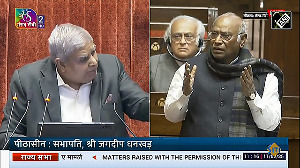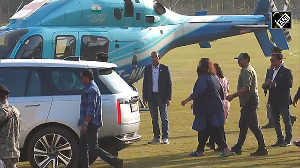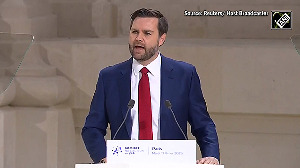Over the next few weeks, almost all the 148 members of the World Trade Organisation will ponder the future of the multilateral body which is at the crossroads with two failed attempts of trade liberalisation in a span of less than four years.
While developing and least developed countries are rejoicing over their new-found unity, the US and the European Union -- which together exported $1.63 trillion dollars worth of industrial and agricultural goods and cornered over a one-third share in merchandise exports of $4.46 trillion in 2002 -- are bound to weigh the advantages of remaining part of a system where even a minnow like Chad has the same veto power.
| |||||||||||
Once talks failed in Cancun last Sunday, European Union Trade Commissioner Pascal Lamy could do little to hold back his anger at the group of 70 developing and least developed countries which blocked his attempts to put in place multilateral rules on investment, competition policy, trade facilitation and transparency in government procurement.
"Despite the commitments of many able people, the WTO remains a medieval organisation," Lamy said.
Developing countries too are raising eyebrows over the functioning of WTO. The decision-making process has been questioned for years with countries accusing the trade body of toeing the US-EU point of view.
For instance, in Doha, instead of taking stock of mandated negotiations on services and agriculture, members were forced to agree on the inclusion of some 20 topics including industrial tariffs, dispute settlement undertakings and link between trade and environment.
Implementation concerns and operationalisation of 88 special and differential treatment issues have not been addressed thanks largely to the resistance being put up by the developed countries.
Even on an issue like Trips and public health, to enable poor countries access to cheap medicines in case of epidemics, the US did not agree till a week before the Cancun meeting.
But the way the draft ministerial declarations were prepared and released in Doha and Cancun has left a lot to be desired. The draft declaration that was to be released on the evening of September 12 was actually released a day later.
Some participants also questioned the appointment of facilitators, who are ministers from member countries and who help in bridging differences and framing the draft declaration.
The facilitator for Singapore issues, for example, was Pierre Pettigrew, Canada's International Trade Minister, a votary of negotiations on the four subjects.
When the declaration was released, it became clear that either the facilitators were hand in glove with the developed countries or had been completely sidelined in the preparation of the draft declaration.
New issues like trade facilitation are expected to put a steep financial burden on developing countries which would be asked to upgrade their customs and port infrastructure to the prevalent levels in the US and EU, just as they have had to invest huge sums to meet the sanitary and phyto-sanitary standards in developed countries.
But no one is questioning the rationale of a system like the WTO. The US and the EU supported the system to push their products into smaller markets in developing and least developed countries by inducing them to cut tariffs on industrial and agricultural products.
As a result, highly protected economies like India reduced duties.
The process did not help developed countries alone; even developing and least developed countries gained through a common rule-based approach which is reflected in increased exports as also countries shifting to source products from more efficient producers as was the case with textiles with the emergence of countries like China, India and Bangladesh and important global players.
But there is growing realisation among developing countries that the deal struck in 1994 was not as fair as it was made out to be and products of their export interest, such as soya bean and rice, continued to be protected by developed countries.
Besides, developed countries complain of undertaking onerous commitments as is evidenced from the fact that an LDC like Nepal, which is one of the two new WTO members, has had to reduce its average agricultural tariffs to 48 per cent while industrial tariffs have to be reduced to 24 per cent.
Earlier, the US and the EU steam-rolled their argument by splitting developing and least developed countries by doling out carrots, but with developing countries realising their mistake, the same approach can no longer be used.
"Gone are they days when we would sit in the corridors and developed countries could get away by giving us some sweeteners," said Malaysian Trade Minister Rafidah Aziz.
Commerce and Industry Minister Arun Jaitley said that trade negotiators from developing countries like India have improved their negotiating skills which is helping them to counter pressures from the developed countries and protecting their interests.
Jaitley said that issue-based coalitions hold the key to negotiations and developing and least developed countries are using the same to push their case.
At Doha, the then commerce minister Murasoli Maran successfully demonstrated that even one country can't be bullied into accepting the agenda put forward by developed countries like the US and the EU.
India has shown the way to other developing countries, resulting in a group of 70 developing and least developed countries blocking attempts by the EU to launch negotiations on Singapore issues.
Though the Indian delegation was disappointed with the failure of the Cancun ministerial, Jaitley said that on the positive side, the draft ministerial declarations in future would reflect the opinion of a majority of the membership.
The developing and the least developed countries have vowed to remain united till their cases are duly recognised by the WTO membership. But the threat by the US of pulling out from the WTO and the fear of proliferation of regional and preferential trade agreements (between, say, the US and Mexico) could make things difficult for smaller countries, which depend on a few products of export or on preferential duty and quota benefits.
US officials have not shown any qualms about adopting the regional trade agreements and preferential trade agreements route.
The EU, which has signed over 30 PTAs, is also expected to go ahead with more if the multilateral trading system does not serve its interests.
The two largest players are going to use the deals under negotiations to push their case at the multilateral level.
It was evident from a statement by Chuck Grassley, Chairman of the Senate Committee on Finance, who questioned the commitment of countries like Columbia, Thailand, Egypt and South Africa, negotiating free trade agreements with the US and part of the G-21 alliance on agriculture.
" (they) are seeking to deepen their relationship with the United States but are resisting opening their own markets in agricultural trade," he said in a statement.
The developing countries, on their part, are trying to strengthen their bonding.
Some members of the coalition of 21 developing countries on agriculture are proposing to institutionalise the arrangement.
"We have been able to produce a platform for reforms in agriculture. Despite pressures we have been able to keep our unity and increased the membership of the alliance," Brazilian foreign minister Celso Amorin said.
While developing and least developed countries are rejoicing at their newfound unity, some believe they will be the biggest losers.
"Sadly, those that will suffer the most from their inability to compromise are the poorest countries amongst us," WTO Director General Supachai Panitchpakdi said in the International Herald Tribune.
The WTO General Council is to meet in Geneva before December 15 to work out ways to revive the deadlocked Doha work programme.
The outcome of the meeting will be decided in the next few weeks when the developed countries test the strength of the coalitions.





 © 2025
© 2025